Saturday June 10, 2017
WOE Team
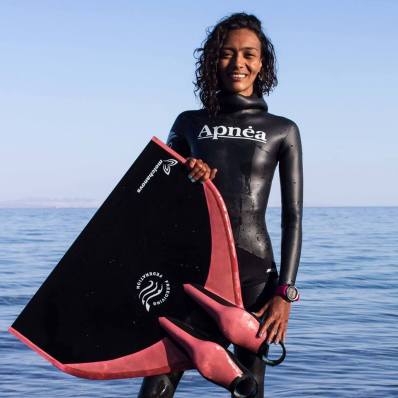 Two years ago, in 2015, Passante Adel left behind her job as an editor of a monthly publication in Cairo and moved to Dahab with her 6-years old son. Because of a near drowning experience as a child, she had developed fear of submergence in water, even in a pool. But living in Dahab became a life changing experience for the 30-years old single mom. Against all odds, she started freediving. Not only had she overpowered her fear, but today, Adel holds four national records for women and is the first Arab freediving female instructor. She is also the deepest female freediver in MENA, and the African record holder.
Two years ago, in 2015, Passante Adel left behind her job as an editor of a monthly publication in Cairo and moved to Dahab with her 6-years old son. Because of a near drowning experience as a child, she had developed fear of submergence in water, even in a pool. But living in Dahab became a life changing experience for the 30-years old single mom. Against all odds, she started freediving. Not only had she overpowered her fear, but today, Adel holds four national records for women and is the first Arab freediving female instructor. She is also the deepest female freediver in MENA, and the African record holder.
WOE: How did you come up with the decision to move to Dahab?
PA: I first moved to Sinai in 2005, but since 2011, I’ve been back in Cairo sort of on and off. In 2015, I realized that I couldn’t continue living in Cairo anymore so it was destination Sinai once again, and Dahab seemed suitable this time.
WOE: Did you face any objections from your family? If yes, how did you deal with it?
PA: My family understood I need to be independent quite some time ago. I faced objections when I first moved out of their house at age 18. Back then I just stood my grounds and they eventually accepted.
WOE: How did you get involved with freediving?
PA: I had friends who were freedivers and I got to learn about the sport from them. At first it appeared both magical and almost impossible to me, and then I decided it’s worth trying so I learnt to swim and be more comfortable in water. As soon as I got a bit comfortable I got an internship in a freediving school and started my courses.
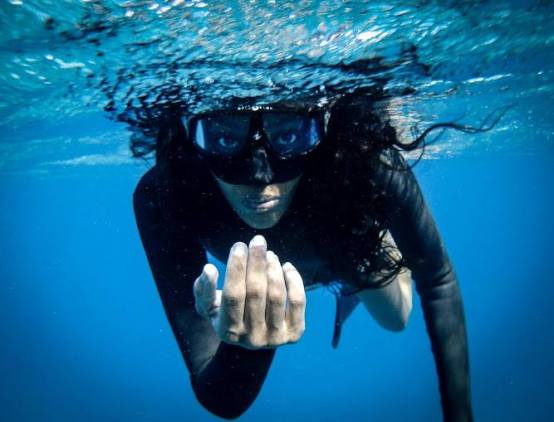
WOE: How many dives do you make per day?
PA: If I’m teaching it’s an average of 30-40 dives per day, but if I’m training for myself it’s 4-6 dives
WOE: What motivates you to keep doing it? What other pleasures you get out of it?
PA: Freediving is by far the biggest challenge against myself; for me it is proof that I can do more than I think I’m capable of. I get many other pleasures from it besides the challenge. Freediving is my meditation; I’ve learnt more about myself in a year of freediving than in the last decade.
WOE: How deep do you dive and how long can you hold your breath?
PA: My personal best is 59m in depth, and 3minutes 56 seconds holding my breath on a dive, and 4m 32sec holding my breath on the surface.
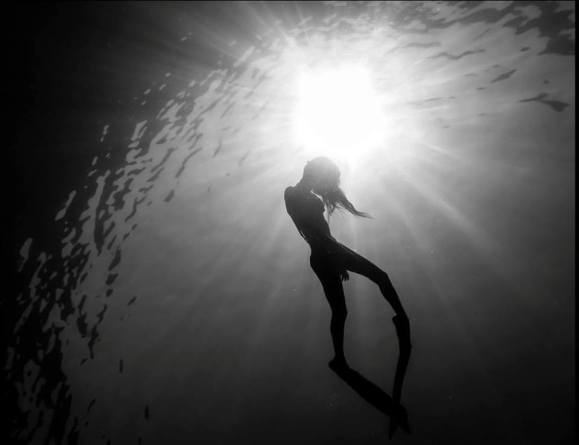
WOE: What’s the world record for holding a breath?
PA: For women, it’s the late Russian freediver Natalia Molchanova with 9m 02sec
WOE: Are people able to hold their breath longer by training?
PA: Of course, it may take time for some but all freediving skills are strengthened via training.
WOE: When do you know it’s the moment for you to start going up?
PA: When I reach the end of the rope, or if I start feeling any pain or pressure.
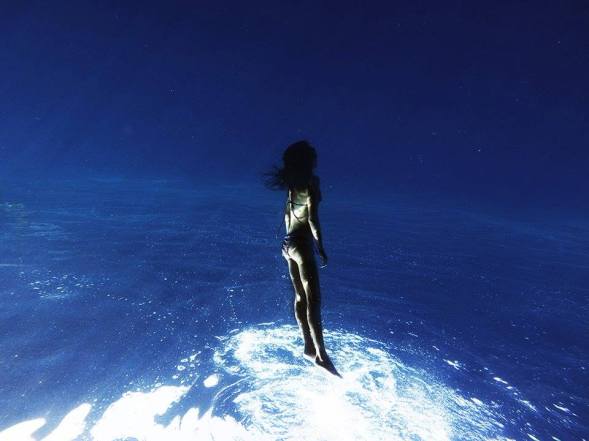
WOE: How do you resist the temptation to keep going down and decide to start swimming back?
PA: I make sure to set my rope to the correct depth and I use a lanyard (safety tool that attaches the freediver to the rope) to stop me from going deeper when I reach my destination (at the end of the rope). The rope is usually set to a depth within my limits –typically around my personal best or only a couple of meters deeper.
WOE: Were there any incidents that you felt you almost ran out of breath?
PA: Not really. I always dive within my limits for safety, and when it’s time to go for a new personal best it has to be progressive, in small steps.
WOE: Were there any moments of fear?
PA: Many; many times at depth my mind has a flood of erratic thoughts: What the heck am I doing here? Why am I doing all this? But on a dive, fear has no place so these thoughts are typically immediately banished from my mind.
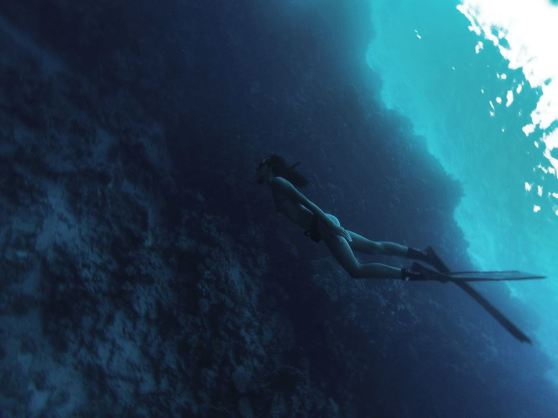
WOE: How do you handle ear pressure in these depths?
PA: I equalize my ears by pinching my nose and pulling/pushing up air from my lungs to my Eustachian tubes which equalizes the pressure on my ear drum.
WOE: Who is your role model in deep freediving? Why?
PA: Has to be the late Natalia Molchanova. She was what I’d call a complete freediver: world record holder in all freediving disciplines, founder of her own school as well as one of the biggest equipment manufactures. Also she is proof that anyone can freedive since she only started her freediving career at age 42!
WOE: Why is Dahab the perfect spot for deep freediving?
PA: The Red Sea has perfect conditions to dive all year around with great visibility, warm waters, no decline in temperature between the surface and depth, almost no underwater currents, and brilliant surface conditions. Here in Dahab we also have the Blue Hole which offers access to depth directly from the shore and –again- one of the best diving conditions in the world.
WOE: Some dive with the help of the rope and some dive without it. What’s the difference?
PA: When freediving for sport (training) or competition you always have the rope for either assistance or for visual guidance. The rope also serves as a safety measure as the diver is attached to it (through the lanyard).
You’d dive without a rope for recreational freediving, for example when exploring the reef, or a wreck, or diving with cetaceans…etc.
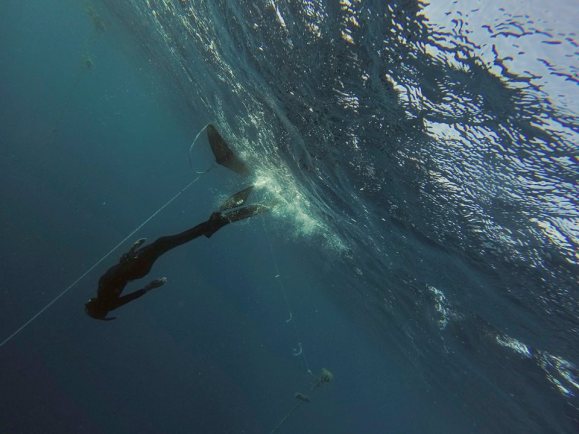
WOE: Did you dive elsewhere? Are there certain diving spots in the world you would like to dive there?
PA: Not yet unfortunately, but would definitely love to dive in places like Tonga, the Philippines, Mexico, Iceland, and in the north sea for Orcas and other big cetaceans.
WOE: What are your short and long term goals?
PA: My short-term goals are more African records and to spread knowledge and safety awareness of the sport. My long-term goal is a world record for Egypt.
WOE: Do you want your son to become a diver too? Is he already engaged in any water sports?
PA: He also has reasons to be uncomfortable with water, but he’s currently getting over them. I’d love him to dive but it’ll have to be his own choice. He’s currently learning to swim and he loves paddling and kayaking.
WOE: Can anyone become a freediver? Is there an age limit or health restrictions to consider before engaging in the sport?
PA: Anyone can freedive without an age limit. However, people with certain conditions like heart conditions, preexisting lung conditions…etc. are advised to consult a physician before diving.
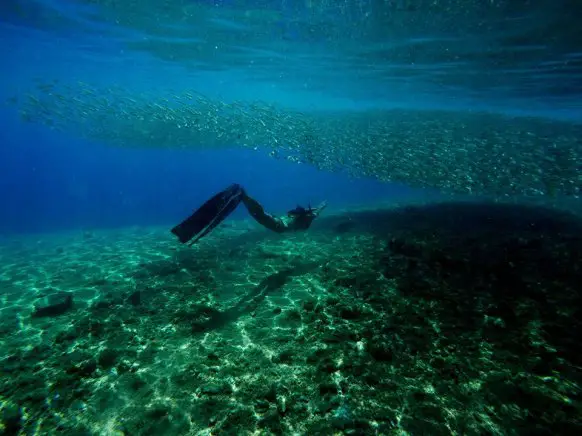
WOE: Freediving for you is a passion, sport or a job?
PA: It is all of these. It’s my passion cause through it I get to know a side of me that’s sometimes lost in the loudness of life, a sport cause it gives me discipline and challenges that push me forward, and a job since I enjoy spreading knowledge of the sport and teaching people new aquatic skills.
WOE: What’s your next step?
PA: Spreading the sport and training hard!
WOE: What’s your advice to people who want to try freediving?
PA: For absolute beginners, I definitely advise them to take a course to learn proper technique and safety measures. Training afterwards can either be done under the supervision of a coach or even with a [certified] training buddy. Another advice or plea to anyone out there who is trying freediving or spearfishing, please do not dive alone. For your safety have a buddy who’s at least a certified beginner. Follow safety rules at all times.
Photos courtesy of Passant Adel
To contact Passant Adel for courses or training sessions, visit her Facebook page
***If you liked this article, subscribe to the magazine and receive our articles in your email.

she is strong. I know her long time ago. she has been through very tough times and she passed them bravely. very proud to be your friend and you’re really inspiring me. Good Luck
LikeLike